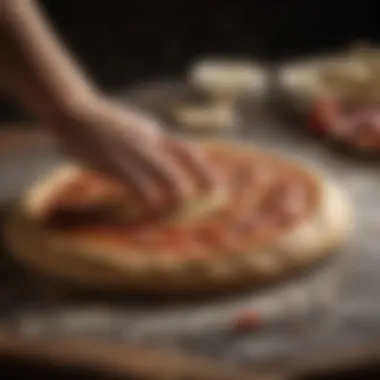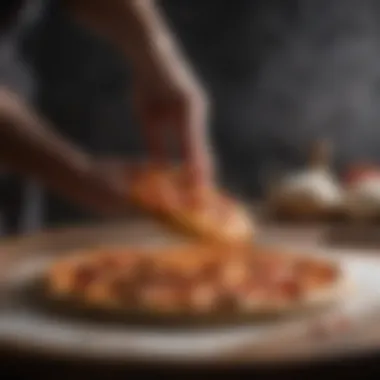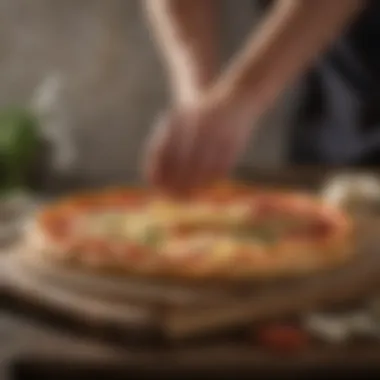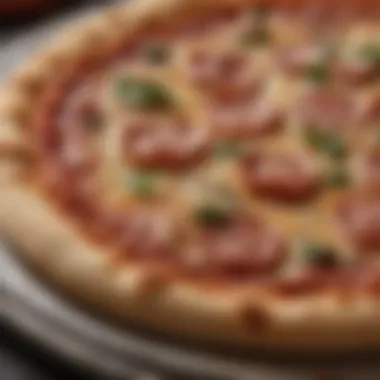Mastering the Art of Achieving Perfect Pizza Crust with a Pizza Crust Press


Pizza Recipe Introduction
In the realm of pizza perfection, achieving the ideal crust is a pursuit that many culinary enthusiasts embark upon. Introducing a pizza crust press into your pizza-making tools opens up avenues to elevate your crust craftsmanship to new levels. This guide will meticulously delve into the art of perfecting pizza crust using a pizza crust press, providing you with insights and techniques to enhance your pizza-making endeavors.
Ingredients and Preparation
To embark on the journey of crafting the perfect pizza crust, key ingredients form the foundation of this culinary creation. From high-quality flour to the right proportions of yeast and water, every element plays a crucial role in shaping the texture and flavor of the crust. Detailed step-by-step instructions will guide you through the process of preparing the pizza dough and sauce, ensuring that each component is crafted with precision. Additionally, valuable tips for handling and preparing the ingredients with finesse will be provided, guaranteeing a seamless and enjoyable cooking experience.
Assembly and Baking
The pivotal moment of pizza-making arrives with the assembly and baking phase. Understanding the techniques for flawlessly assembling the pizza with a plethora of delectable toppings is essential. Moreover, insights into achieving the perfect bake, including oven temperature control and optimal baking duration, will be shared to guarantee a crispy yet tender crust. Furthermore, exploration of variations and customization options will empower you to add a personal touch to the recipe, creating a unique culinary masterpiece.
Serving Suggestions and Pairings
As the perfectly baked pizza emerges from the oven, considerations for serving it with finesse and flair come into play. Recommendations for garnishes, additional toppings, and sauces will elevate the visual appeal and taste of the pizza, adding layers of complexity to the dining experience. Furthermore, pairing suggestions for beverages and side dishes will be provided to complement the flavors of the pizza, creating a harmonious symphony of tastes on the palate.
Cook's Notes and Tips
Before concluding this culinary journey, additional insights and tricks will be unveiled to enrich the flavor and texture of your pizza creation. From enhancing the umami notes with specific herbs to troubleshooting common issues that may arise during the preparation and baking process, these expert tips will equip you with the knowledge and skills to overcome any culinary challenges. Embrace the intricacies of perfecting pizza crust with a pizza crust press, and let your culinary prowess shine through each delectable slice.
Introduction to Pizza Crust Press
When delving into the realm of perfecting the pizza crust, the introduction to a pizza crust press emerges as a pivotal component. This section is not merely about machines but about precision and dedication to achieving the ideal pizza foundation. Understanding the nuances of a pizza crust press sets the tone for mastering the art of crafting impeccable pizzas. From ensuring consistency in crust thickness to enhancing efficiency in pizza production, the introduction to a pizza crust press serves as the gateway to culinary excellence.
Understanding the Purpose of a Pizza Crust Press
The Role of Consistency in Crust Thickness
The role of consistency in crust thickness is a fundamental aspect that underlines the essence of using a pizza crust press. Consistency ensures that each pizza base maintains a uniform thickness, crucial for baking evenly and achieving the desired texture. In the context of this article, emphasizing consistency in crust thickness highlights the demand for precision in pizza preparation. This feature is a critical choice as it guarantees that every pizza leaving the kitchen adheres to the highest standards of quality and taste. The unique characteristic of maintaining uniform crust thickness elevates the overall pizza experience by delivering a uniform bite every time, a trait highly sought after in the culinary world.
Enhancing Efficiency in Pizza Production
Enhancing efficiency in pizza production is not just a matter of speed but a reflection of operational excellence. By streamlining the dough pressing process with a pizza crust press, pizzerias can significantly increase output without compromising on quality. Efficiency plays a vital role in meeting customer demand, especially during peak hours, making it a valuable investment. The ability to optimize pizza production through technology showcases a commitment to craftsmanship and customer satisfaction. While enhancing efficiency brings about advantages such as faster service and increased productivity, attention must also be paid to maintaining quality standards to avoid compromising the final product.


Benefits of Using a Pizza Crust Press
Uniformity in Crust Texture
Uniformity in crust texture is a key advantage offered by utilizing a pizza crust press. This feature guarantees that every pizza base has a consistent texture, leading to a more enjoyable eating experience. The uniformity in crust texture serves as a testament to the precision and accuracy achievable with modern culinary technology. In the context of this article, highlighting the importance of uniform crust texture underscores the commitment to delivering perfection in every bite. The unique benefit of uniformity ensures that every pizza churned out from the kitchen meets the highest standards of quality, appealing to discerning pizza enthusiasts.
Time-Saving Advantage
The time-saving advantage associated with using a pizza crust press revolutionizes the pace of pizza production. By automating the pressing process, valuable time is saved, allowing for increased output and quicker service delivery. Time-saving becomes a pivotal factor, especially in a fast-paced culinary environment where every minute counts. While the time-saving advantage boosts efficiency and productivity, it is essential to balance speed with maintaining the artisanal quality that defines a premium pizza establishment.
Types of Pizza Crust Press Available
Manual Pizza Crust Press
The manual pizza crust press introduces a hands-on approach to dough pressing, providing chefs with control over the process. This type of press appeals to traditionalists who value the craft of pizza making and seek a more personalized touch in their creations. The key characteristic of the manual pizza crust press lies in its tactile nature, allowing chefs to finesse the dough to achieve the desired thickness and texture. While manual operation offers a sense of craftsmanship and control, it also demands skill and experience to consistently produce high-quality pizza bases.
Automatic Pizza Crust Press
Contrasting the manual counterpart, the automatic pizza crust press brings a level of automation that optimizes efficiency and standardization. This type of press caters to establishments with high pizza production volumes, streamlining the process and reducing manual labor. The key characteristic of automation presents a hands-free solution that accelerates production without compromising on consistency or quality. The unique feature of automation in the pizza crust press domain offers a scalable solution for businesses aiming to meet consumer demand without sacrificing the artistry and essence of authentic pizza craftsmanship.
Techniques for Using a Pizza Crust Press
In this article, delving into the art of perfecting pizza crust is incomplete without emphasizing the vital role of employing proper techniques with a pizza crust press. The precision in utilizing a pizza crust press can greatly impact the final result of the pizza crust, ensuring it meets the desired standards. By understanding and implementing effective techniques, like accurately preparing the dough and operating the press with finesse, one can achieve consistency and excellence in pizza production. The mastery of these techniques can elevate the quality of pizzas produced and streamline the overall process.
Preparation Steps Before Pressing
Dough Conditioning
Discussing the intricate process of dough conditioning is imperative in optimizing the use of a pizza crust press for the best outcomes. Dough conditioning involves the manipulation of the dough's temperature and humidity to enhance its extensibility and overall texture. This technique plays a crucial role in ensuring that the dough is in an ideal state for pressing, resulting in a perfect crust that is uniform and flavorful. While dough conditioning requires time and attention to detail, its benefits in enhancing the quality of the final product make it a preferred choice for professional pizza makers.
Proper Dough Portioning
Proper dough portioning is a fundamental step in the preparation process before pressing the dough with a pizza crust press. This step involves dividing the dough into equal portions, ensuring consistency in crust thickness and size. By portioning the dough appropriately, the pizza maker can control the final dimensions of the pizza crust, contributing to a visually appealing and professionally crafted pizza. Although proper dough portioning demands precision and patience, its advantages in achieving uniformity and balance in the pizza crust make it an essential practice for achieving culinary perfection.


Operating the Pizza Crust Press
Adjusting Pressure Settings
When operating a pizza crust press, the ability to adjust pressure settings is a critical aspect that directly influences the outcome of the crust. By fine-tuning the pressure settings based on the dough's characteristics, the pizza maker can control the thickness and texture of the crust with precision. This feature of adjusting pressure settings ensures that the dough is pressed uniformly, resulting in consistent crust thickness throughout the pizza. While mastering the adjustment of pressure settings requires practice and experimentation, the advantages of achieving a perfect crust with customized thickness justify the effort.
Ensuring Even Distribution
Ensuring even distribution of pressure while using a pizza crust press is essential for producing pizzas with a consistent quality crust. This technique involves maintaining a balanced distribution of pressure across the dough to prevent uneven thickness or texture variations. By ensuring even distribution, the pizza maker can achieve uniform results with every pizza crust, enhancing the overall presentation and taste of the pizzas. Though achieving even distribution may pose challenges initially, the benefits of creating perfectly pressed crusts that meet professional standards make it a valuable skill to hone.
Troubleshooting Common Pressing Issues
Uneven Crust Thickness
Addressing the issue of uneven crust thickness is crucial when encountering variations in the pressed dough's flatness after using a pizza crust press. Uneven crust thickness can result from inconsistencies in the pressing technique or uneven dough portions. By identifying the root cause of this issue and implementing corrective measures, such as adjusting the pressing process or redistributing the dough, the pizza maker can rectify uneven crust thickness effectively. Resolving this common pressing issue is essential for maintaining the standards of pizza crust quality and ensuring customer satisfaction.
Dough Sticking
Dealing with the challenge of dough sticking during the pressing process is a common concern faced by pizza makers using a crust press. Dough sticking can hinder the smooth operation of the press and lead to imperfections in the crust's appearance and texture. By implementing preventive measures, such as proper dough conditioning and adjusting the pressing technique, the issue of dough sticking can be mitigated. Overcoming dough sticking challenges requires attention to detail and persistence, but the advantages of producing flawless, non-sticky crusts justify the diligence in troubleshooting this pressing issue.
Maintenance and Care of a Pizza Crust Press
In this section, we focus on the critical aspect of maintaining and caring for a pizza crust press. Ensuring the upkeep of this equipment is vital to guaranteeing its longevity and optimal performance. Regular maintenance not only extends the lifespan of the press but also contributes to consistent output quality in pizza production. Ignoring maintenance can lead to breakdowns, affecting operational efficiency and potentially compromising food safety standards. Careful attention to cleaning and upkeep is essential for any foodservice establishment utilizing a pizza crust press.
Cleaning and Sanitizing Procedures
Daily Cleaning Routine
The daily cleaning routine plays a pivotal role in upholding hygiene standards and preventing cross-contamination in the kitchen. This routine involves thorough cleaning of all surfaces that come in direct contact with the dough. Using food-safe cleaning agents, such as sanitizing solutions, ensures the removal of any food residue or bacteria buildup. The daily cleaning routine not only promotes a sanitary work environment but also preserves the integrity of the pizzas being produced. Implementing a stringent daily cleaning regimen is non-negotiable for maintaining operational excellence in pizza establishments.
Deep Cleaning Recommendations
Deep cleaning is a more intensive procedure that aims to disassemble the press for a more thorough sanitization process. This deep cleaning practice targets hard-to-reach areas, such as crevices and components within the press. By taking apart the press, operators can meticulously clean each part to eliminate any hidden debris or grime. Deep cleaning should be conducted at regular intervals to prevent the accumulation of dirt or contaminants that may affect the quality of the pizza crusts. While time-consuming, deep cleaning is indispensable for ensuring food safety compliance and maximizing the longevity of the equipment.


Regular Maintenance Practices
Inspecting Mechanical Parts
Inspecting the mechanical parts is a crucial part of preventive maintenance for a pizza crust press. This practice involves visually checking all moving components, such as hinges, levers, and rollers, for signs of wear or damage. Regular inspections help identify potential issues early on, allowing for timely repairs and replacements as needed. By proactively inspecting mechanical parts, operators can prevent sudden breakdowns during busy periods and maintain consistent pizza production output. Prioritizing routine inspections is key to upholding equipment reliability and minimizing downtime in the kitchen.
Lubrication Guidelines
Proper lubrication is essential for ensuring smooth operation and prolonging the lifespan of a pizza crust press. By adhering to manufacturer-recommended lubrication guidelines, operators can mitigate friction between moving parts, reducing wear and tear on critical components. Applying food-grade lubricants at specified intervals helps maintain the press's functionality and prevents mechanical issues caused by excessive friction. Following lubrication guidelines diligently not only enhances equipment performance but also plays a significant role in optimizing the overall efficiency of pizza crust production processes.
Innovations in Pizza Crust Press Technology
In the ever-evolving world of pizza-making, innovations in pizza crust press technology play a pivotal role in enhancing efficiency and quality. These advancements are crucial in ensuring that pizzerias and restaurants can meet the demands of a discerning clientele while streamlining their operations. By incorporating cutting-edge features, modern pizza crust presses have revolutionized the way pizzas are prepared and produced.
Smart Features Integration
Digital Controls
Digital controls are a core component of advanced pizza crust press technology. Their precise calibration allows operators to achieve consistent results with every press. The key characteristic of digital controls lies in their ability to provide accurate pressure settings, ensuring that the desired crust thickness is maintained throughout the pressing process. This feature is particularly beneficial for optimizing crust texture and density, catering to varied preferences among pizza connoisseurs.
Moreover, the unique feature of digital controls is their user-friendly interface, enabling operators to easily adjust and monitor settings. This user-centric design enhances operational efficiency and minimizes the likelihood of errors, making digital controls a popular choice for establishments seeking reliable and effective pizza crust pressing solutions.
Automated Dough Thickness Adjustment
Automated dough thickness adjustment represents another significant innovation in pizza crust press technology. By automating the adjustment process, this feature simplifies operation and reduces the margin for human error, resulting in consistently uniform crust thickness. The key characteristic of automated dough thickness adjustment is its ability to calibrate the press according to predefined specifications, ensuring precision and repeatability across batches.
One of the primary advantages of this feature is its time-saving potential, as operators can achieve optimal results without the need for manual adjustments. Additionally, automated dough thickness adjustment streamlines the pressing workflow, enhancing productivity and promoting a more efficient pizza-making process. While some establishments may need to acclimate to the automated system, the overall benefits in consistency and speed make it a valuable asset for modern pizzerias.
Energy-Efficient Designs
Sustainability Focus
Energy-efficient designs in pizza crust presses reflect a broader emphasis on sustainability within the food industry. By incorporating eco-friendly features and materials, manufacturers aim to reduce environmental impact while maintaining operational effectiveness. The key characteristic of sustainability-focused designs is their use of renewable resources and energy-saving technologies, aligning with the growing demand for greener practices in commercial kitchens.
The unique feature of sustainability-focused pizza crust presses is their ability to optimize resource utilization without compromising performance. From energy-efficient motors to recyclable components, these presses offer a holistic approach to sustainable pizza production. While initial investment costs may be slightly higher, the long-term benefits of lowered utility bills and enhanced brand reputation make sustainability a compelling choice for eco-conscious establishments.
Reduced Power Consumption
Reduced power consumption is a critical aspect of energy-efficient pizza crust press designs, contributing to cost savings and environmental responsibility. By employing efficient motors and power management systems, these presses minimize electricity usage without sacrificing pressing capabilities. The key characteristic of reduced power consumption lies in its ability to maintain high performance while operating within defined energy parameters.
The unique feature of reduced power consumption is its adaptability to varying production demands, allowing operators to prioritize energy conservation without compromising output quality. By optimizing power utilization during idle periods and peak usage, pizza crust presses with reduced power consumption demonstrate a conscientious approach to resource management. While considerations such as maintenance and compatibility may influence adoption, the overall advantages in cost efficiency and sustainability make it a compelling choice for forward-thinking food establishments.







